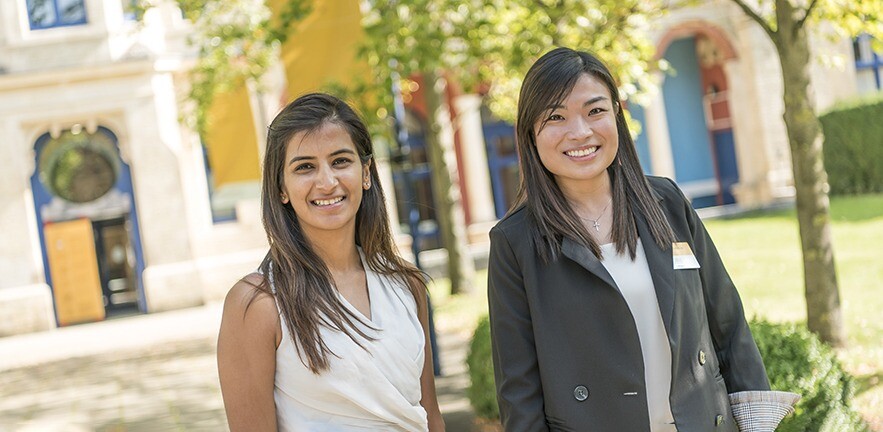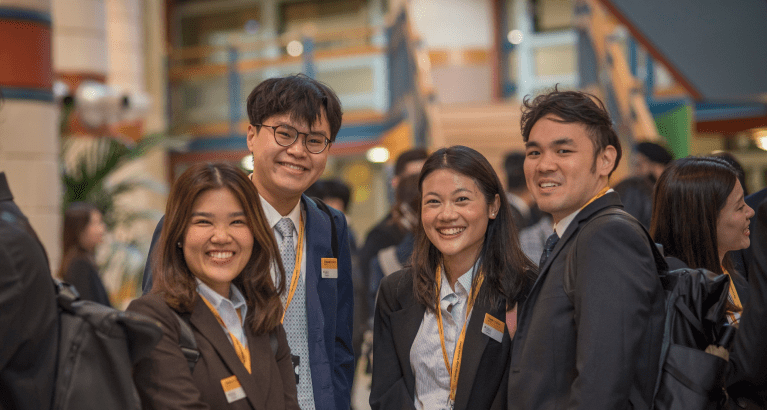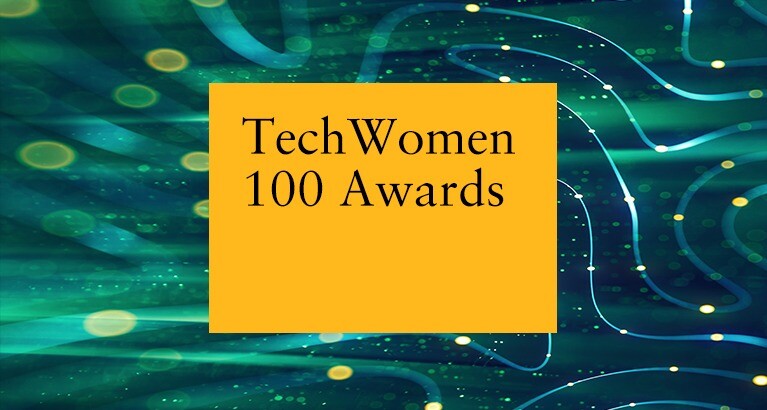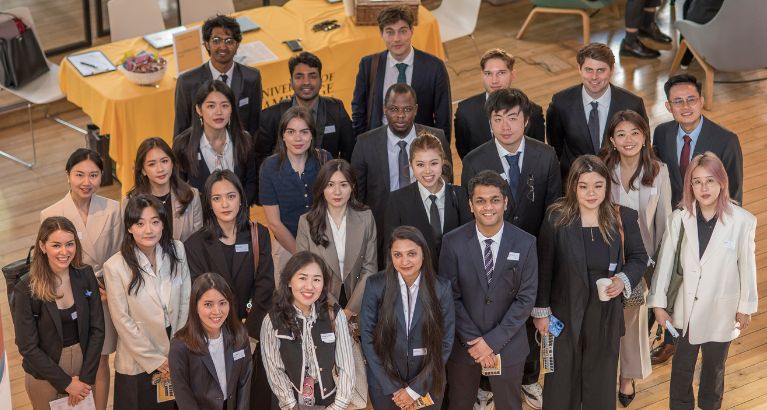So close! The last lap of this highly competitive application marathon can feel like the toughest. Up ahead is the MBA interview, often described as daunting for candidates closing in on the finishing line.
For the Business School, speaking to you directly adds an essential extra dimension to the pages of your written track record. You can tell us in your own words about your achievements, impact and MBA objectives.
“It is not a test. There are no set questions. You will be interviewed by a faculty member who will be trying to get to know you better, to understand your potential and see if your goals fit with the programme’s ambitions. Be prepared to have a really interesting conversation across a wide range of topics,” says Emily Brierley, Head of MBA Admissions and Recruitment.
“Treat it like a job interview,” she adds.
Jumping off the admissions page
Each year, students from a dynamic mix of cultures, backgrounds and nationalities are selected for the Cambridge MBA programme. There is no ‘one applicant size’ that fits all for this MBA. We do look, however,for people with strong global mindsets who enjoy working with others who are different from themselves. To fit in with our learning culture, we look beyond an exceptional CV to consider how you work with your peers, what you can offer the class and bring to the wider University community.
“Skills and personality traits like resilience, self-awareness, and critical reflection are always going to be important to us,” says Charlotte Russell-Green, Head of MBA Recruitment and Admissions at Cambridge Judge Business School.
To stand out in a candidate crowd, start by re-reading your application to distill the points about yourself that you want to be remembered for. During the interview direct answers with specific examples will bring the best results. Sticking to your own story of why you deserve a place is better than trying to second guess what the interviewer might want to hear. Learning scripted answers, however, will lack spontaneity and won’t launch your application over this MBA finishing line.
Invited to interview
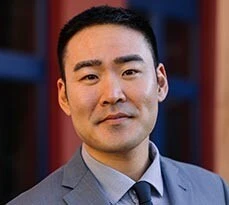
Matthew Hou (2020) was able to visit Cambridge in person during the early recruitment rounds before the global pandemic in 2020. Not only did he “fall in love with Cambridge” but he says the way the interviews were conducted influenced his decision to choose this school over others.
“The Cambridge MBA Admissions team did a huge amount of work co-ordinating a diverse cohort for interview. It was conducted by the Business School faculty, which is not always the case with comparable MBA programmes, where you could be talking to an alumnus in a different city.
“The interview was not easy. But it was a great way to highlight myself beyond my CV and the essays, and for the interviewer to understand the strengths in leadership team development that I would be able to contribute to the programme and cohort,” says Matthew.
The Cambridge day updated
Shortlisted candidates are usually invited to Cambridge Judge Business School for the faculty interview which is scheduled around a series of career consultations and sociable gatherings across this stunning university city.
Due to the ongoing impact of COVID-19 however, all 1:1 interviews will be held on Zoom until the end of the next admissions cycle in 2022.
“We will still be able to give students a real glimpse of what it’s like to study for their MBA at Cambridge. As well as the interview, there will be a Q&A session with the CJBS Careers team, the MBA Executive Director and of course, with MBA Admissions. Virtual networking opportunities will be on offer with alumni and current students so applicants can find out more about what it’s like to be a student here,” says Emily Brierley, who is part of the team that co-ordinates the virtual interview days.
“Our advice is to be honest and open about yourself and your future goals. Your choice of business school is a big decision, and your success will depend on the support of those around you,” adds Diana Mendonca Ajuz, another member of the MBA Admissions team.
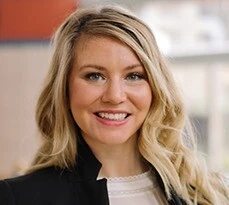
Recent graduate Katherine Danielson (MBA 2020) had her Cambridge interview online due to the ongoing COVID-19 pandemic. She hadn’t been able to visit any campuses in person before making her decision about which MBA programme might be the right fit for her.
“What was important for me was really trying to get as much information and connection to the Cambridge school as possible by talking to alumni, other students, and to faculty,” says Katherine.
And the interview? “It still felt very natural. The conversation I had with my interviewer was really great, so I don’t think that I was at a disadvantage at all because it was not “in-person.” The interviewer seemed genuinely interested in getting to know me and understanding why I wanted to join this particular MBA programme. If you’re preparing for an online interview, I think you’re going to get as much out of it as you put into it.”
An executive masterclass
Remote interviews require careful consideration if you are going to put “your best self forward in every scenario” agrees our MBA Executive Director. His podcast, Changing Careers with Conrad Chua, gives a wide range of detailed technical advice for conducting interviews and presentations online.
“The one take away I want everyone to have is that you need to prepare your virtual interview and presentation. I recommend at least half a day practising and perfecting what you will do online. That’s on top of all the other preparations that you still have to make as if this were a face-to-face interview. That includes research, as well as practising with a friend or a careers professional.”
He describes it as adding ‘the gloss’ needed to ace that interview.
“The key is planning for all contingencies. Virtual interviews are here to stay. Prepare your own checklist of things to do so you can develop a routine,” he adds.
A 2-way conversation
“Choosing a school which is right for you is a very personal decision. It is important that you pick one which is the right fit, as it is a significant investment of time and money,” says Charlotte Russell-Green, Head of MBA Recruitment and Admissions.
The University of Cambridge’s reputation for “academic excellence going back hundreds of years can be intimidating” she adds. One of the main strengths of Cambridge Judge Business School, however, is the collaborative ethos that is embedded within all aspects of the MBA programme.
“The faculty interview is indicative of what the culture is like here.It is collaborative more than competitive, so, we can help each other to be the best we can be.”
“The interview will be a 2-way conversation. You will have the opportunity to get a feel for our values, get your questions answered as well as the faculty being able to find out about you.”
In conclusion Charlotte says, “The faculty members take a genuine interest in the students that we have here. That kind of relationship is built from the interview process onwards”.

The final word goes to alumnus Srishti Warman (MBA 2019), who remembers what it is like to be an MBA applicant with the finishing line in her sights.
“I requested an interview on video by Skype, at the time. While it’s obvious to feel nervous before an interview, I don’t think I had ever been so anxious before. My interviewer was a faculty member teaching at Cambridge Judge, and the warmth in their tone made me feel relaxed immediately. From all the business school interviews that I had ever given, in no other interview did I feel so supported by the interviewer to give the answers that I felt and knew were right. I knew then it was a clear reflection of what it would be like to study at Cambridge,” says Srishti Warman, Product Manager at Concentra Analytics.


